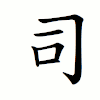司
| ||||||||
Translingual
| Stroke order | |||
|---|---|---|---|
| Stroke order | |||
|---|---|---|---|
 | |||
Han character
司 (Kangxi radical 30, 口+2, 5 strokes, cangjie input 尸一口 (SMR), four-corner 17620, composition ⿹𠃌𠮛)
Derived characters
References
- KangXi: page 174, character 3
- Dai Kanwa Jiten: character 3257
- Dae Jaweon: page 385, character 8
- Hanyu Da Zidian (first edition): volume 1, page 572, character 8
- Unihan data for U+53F8
Chinese
| simp. and trad. |
司 | |
|---|---|---|
| alternative forms | 𤔲 | |
Etymology
From Proto-Sino-Tibetan *zə; cognate with Proto-Kukish */ca/, Mru caŋ (“to do, to make”), & Tibetan [script needed] (mdzad.pa), [script needed] (mdzod), from underlying */m-za-t/ "to do, to act", possibly also related to [script needed] (bzo, “work, labour”) (Schuessler, 2007).̈ Schuessler disputes Löffler's (1966) proposed connection to 乍 (OC *zraːɡs, “to do, work, make”) due to phonological difficulties.
Unger (1984) posits a possible relationship with Tibetan [script needed] (rdzi.po, “herdsman”)
Pronunciation
Compounds
Derived terms from 司
|
|
|
Japanese
Readings
Compounds
Etymology 1
| Kanji in this term |
|---|
| 司 |
| つかさ Grade: 4 |
| kun’yomi |
| For pronunciation and definitions of 司 – see the following entry. | ||
| ||
| (This term, 司, is an alternative spelling of the above term.) |
Etymology 2
| Kanji in this term |
|---|
| 司 |
| まもる Grade: 4 |
| nanori |
| For pronunciation and definitions of 司 – see まもる. (This term, 司, is an alternative spelling of the above terms.) |
(The following entry is uncreated: まもる.)
Korean
Hanja
司 • (sa) (hangeul 사, revised sa, McCune–Reischauer sa)
- This term needs a translation to English. Please help out and add a translation, then remove the text
{{rfdef}}.
Vietnamese
This article is issued from Wiktionary. The text is licensed under Creative Commons - Attribution - Sharealike. Additional terms may apply for the media files.